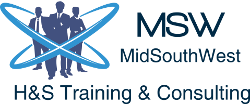All employees should understand the basics of hazard identification and reporting
|
Hazards are generally sorted into two broad categories:
Health hazards contribute to occupational illness and disease. They’re pervasive because they’re not clearly defined, sometimes unnoticeable, and workers may ignore warning signs or symptoms that are indicative of the presence of a potential health hazard.
The effects of health hazards are not always immediate, sometimes taking months or even years to appear. As well, it is often the case that illnesses resulting from health hazards are irreversible. The five health hazard categories are:
Learn More about Hazard Identification Training. |
 |
Training is key to having an effective and efficient JHSC.
Musculoskeletal/Ergonomic Hazards
|
Many ergonomic hazards are caused by poor work design. Ergonomic hazards may result in repetitive strain injuries (RSIs) or musculoskeletal disorders (MSDs). Examples include ailments such as carpal tunnel, tendonitis, Reynaud’s syndrome, and more. Office employees who have improper workstation set-ups, or who do not have ergonomic training and therefore do not practice good ergonomic habits are prone to muscle aches and stiffness, sore backs, and other more serious ergonomic issues. Work shouldn’t hurt! MSDs are caused by factors such as:
Prevent Ergonomic Injuries Today! |
 |
Chemical Hazards
 |
Chemical hazards affect health in numerous ways. Chemicals can exist in three states:
Hazards occur when chemicals are stored, used, mixed, or disposed of improperly. Exposure to controlled products without proper PPE or education can also result in serious health consequences. WHMIS Training is Mandatory in Ontario. |
Biological HazardsBiological hazards result from contact with biological agents. These include, but are not limited to:
Contact with harmful biological agents can occur through inhalation, ingestion, absorption (via the skin or other membrane) or injection. While it may seem impossible to imagine ingesting a harmful biological agent, events such as cross-contamination, mislabeling, or lack of PPE are usually contributing factors. |
Physical HazardsPhysical hazards are the health hazards that result from our physical environment/surroundings. Physical hazards include:
|
Psychosocial HazardsPsychosocial hazards are invisible but very pervasive. They can have a very serious effect on mental health and wellbeing. Prolonged exposure to psychosocial hazards can lead to irreversible mental illness, high blood pressure, and heart disease. Often, little attention is paid to psychosocial hazards because of their invisible nature, or because of the mistaken belief that they won’t result in serious adverse health effects. Psychosocial hazards include:
|
 |
Hazard Recognition and RACE Training
All employees should understand the basics of hazard identification and reporting.
To ensure that your JHSC members recognize potential health hazards in the workplace, they need to be RACE masters. That is, the need to be able to Recognize, Control, Assess, and Evaluate hazards and hazard controls. JHSC certification training covers RACE in detail so that all certified members understand RACE and can apply it effectively in the workplace.
To ensure that your JHSC members recognize potential health hazards in the workplace, they need to be RACE masters. That is, the need to be able to Recognize, Control, Assess, and Evaluate hazards and hazard controls. JHSC certification training covers RACE in detail so that all certified members understand RACE and can apply it effectively in the workplace.
Trust MidSouthWest Training and Consulting
Training is key when it comes to having an effective and efficient JHSC.
MidSouthWest Training and Consulting provides JHSC training in association with Langlois Safety Training and Consulting Services, an approved CPO Provider. We offer in-house and on-site JHSC Part One, Part Two, and Refresher training. We also offer Hazard Identification Training. You can trust MidSouthWest Training and Consulting to provide you with cost-effective training solutions tailored to meet your organization’s unique health and safety needs.
To learn more, contact us online or call 289.309.1143. Visit us 24/7 on the web at midsouthwest.ca.
MidSouthWest Training and Consulting provides JHSC training in association with Langlois Safety Training and Consulting Services, an approved CPO Provider. We offer in-house and on-site JHSC Part One, Part Two, and Refresher training. We also offer Hazard Identification Training. You can trust MidSouthWest Training and Consulting to provide you with cost-effective training solutions tailored to meet your organization’s unique health and safety needs.
To learn more, contact us online or call 289.309.1143. Visit us 24/7 on the web at midsouthwest.ca.
Last updated October 12, 2022




